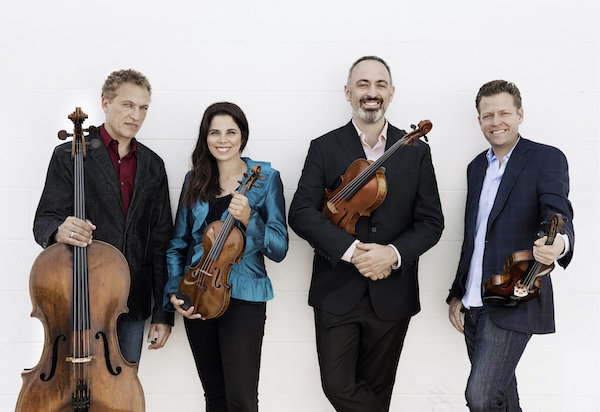Pacifica Quartet, Moser find kindred spirits in Schubert and Wolfe

In March of 1824, Franz Schubert wrote to the painter Leopold Kupelwieser in a state of absolute misery: “Think of a man whose splendid hopes have come to naught, to whom the happiness of love and friendship offer nothing but acute pain.”
Schubert was suffering from a venereal disease that would claim his life in 1828. But those final years also brought a flood of creativity. In his last months alone, the composer penned three piano sonatas, the Schwanengesang, and String Quintet in C major — works that in their own way seem to wrestle with feelings about death.
The composer’s internal struggle served as an unlikely inspiration for Julia Wolfe, who wrote Splendid Hopes in 2016 as a belated companion piece to the Schubert string quintet. Both works made for a compelling, even life-affirming program offered by cellist Johannes Moser and the Pacifica Quartet Sunday afternoon at the Gardner Museum’s Calderwood Hall.
Wolfe’s music, with its driving minimalism and almost psychedelic sweep, carries a palpable emotional intensity that, like her Pulitzer Prize-winning Anthracite Fields, places listeners directly into the mental state of its subject. The driving figures that course throughout Splendid Hopes create a stormy soundscape, perhaps reflecting the anxieties Schubert must have felt as he faced his end.
With scoring for the same forces as Schubert’s quintet (two violins, viola, and two cellos), Wolfe achieves this tempest by simple, incremental means. Tremolo figures that dominate the 25-minute piece’s texture first appear in dusky cello, spread to the full ensemble and, little by little, cluster into dissonances that resolve in a flurry of arpeggios.
There is little sense of melody in Splendid Hopes, although the violins unveil sweeping, angular themes as the music progresses. The viola and cellos join the frenzy before it dissolves into a low C in the cello, upon which the players stack bristly chords for an abrupt end. Splendid Hopes is music at its most elemental, and Moser and the Pacifica Quartet gave it stellar advocacy.
Schubert’s String Quintet in C major, which came after intermission, made for a searching complement. The composer’s last chamber work is almost symphonic in scope, and the musicians revealed it in all of its grandeur.
Moser and Pacifica charted the opening harmonic progression with apt sensitivity, drawing attention to every sudden shift in key. The ensuing cascade of notes flowed congenially from Pacifica violinists Simin Ginatra and Austin Hartman, while the second theme took on tender warmth in the playing of Moser and Pacifica cellist Brandon Ramos. The dotted figures that draw the exposition to a close in Allegro ma non troppo first movement positively bounded, the music more an expression of gaiety than agitation.
The Adagio that followed stands as one of Schubert’s most sublime slow movements, and the musicians found an operatic lyricism locked within its deceptively simple structure. Ganatra and Moser framed the harmonies central to the texture with gentle melodic fragments and supportive bass; by movement’s end, their statements flowered into lines that rose, coiled softly and fell away. The middle section offered a bold contrast, Pacifica violist Mark Holloway and compatriots rendering the music with dynamic force and swift lilt.
The rest of the performance also showcased the musicians’ expressive range. The Scherzo coursed with a rustic vitality, its Trio section taking on a hymn-like serenity. The musicians charted the closing Allegreto with gypsy swagger and a fluent sense of line. An urgent coda brought the work — and this thoughtful concert — to a firm conclusion.
The Gardner Museum will present pianist Nicolas Namoradze in music by Bach, Alexander Scriabin and Alexina Louie 1:30 p.m. March 1 at Calderwood Hall. gardnermuseum.org
Posted in Performances



